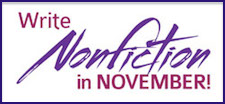 So you’re trying to write a nonfiction book in one month, eh? Well, guess what? You also need to keep blogging.
So you’re trying to write a nonfiction book in one month, eh? Well, guess what? You also need to keep blogging.
Consistency is key to blogging. Whether you’ve committed to writing a new post twice a month or twice a week, once you establish your schedule your readers will expect you to stick to it.
It’s not a onerous task. After all, you’re a nonfiction writer and writing makes you tick, right?
People who abhor reading and writing don’t become writers; people like you do. So don’t think of your blog as a necessary evil or a task that you have to do. Think of it as another opportunity to further your craft and discover your voice.
Stephen King said that no one can call themselves a writer until they’ve written 50 stories.
Well, I say that anyone who maintains an active blog is a writer.
There are five downfalls to successful blogging that you’ll want to avoid:
- Lack of consistency.
- Lack of goals.
- Loss of focus.
- Not knowing what you’re passionate about.
- Not establishing a blog calendar.
Your Blog Needs Passion
Let’s talk about passion. I think this is the most important factor to a successful blog. Without passion, you will lack the drive to maintain an active, innovative blog that people will look forward to reading.
Passion can wane at times, but don’t let the flame die. When you have difficulty coming up with new topics, take a walk or a run, go to the gym and lift some weights, or read other blog posts within your niche to find out what others are writing about.
You also need to have a goal in mind. The goal of my blog is to help authors use social media to promote their books. My goal defines my focus. It’s also my passion.
Maybe your goal is to help people with Celiac disease so they can lead healthier lives. Or maybe you survived cancer or live with diabetes and yearn to educate people about their diseases and provide encouragement and updates on scientific research.
Let’s say that your passion falls in the spiritual realm. You may want to focus on the importance of practicing meditation, compassion and empathy.
When you’re clear on your passion and your goals, it will be easier to maintain your focus and have ideas for new posts.
Plan Your Posts with an Editorial Calendar
Create a three-month editorial calendar that maps out the topics of future posts. As you research your topics and read other blogs in your niche, jot down ideas for posts you can write.
Perhaps you have a different perspective on a blog post a colleague wrote. For example, Adam Connell of Blogging Wizard wrote a post about the new rules of blogging. I took that post, credited him, and then explained why each point he made either did or didn’t work for Indie authors.
Editorial calendars are also helpful for times when you plan a vacation. You have your calendar, and you know what you need to write about. All that’s left is to write the posts ahead of time.
The same is true for NaNoWriMo and Write Nonfiction in November. Hopefully, you planned your posts for the month and wrote them in advance of November 1.
If you didn’t, then turn some of the chapters you are now writing into blog posts.
How to Write Blog Posts Your Audience Craves
There isn’t a formula for knowing how to reach your audience with your blog. It takes work, patience, experimentation, and perseverance. However, I can suggest these tips:
- Use Survey Monkey to ask your readers what they most want to learn from you through your blog.
- Some say blog posts should be brief; others say they should be at least 1,200 – 1,800 words. Seth Godin, a master blogger, doesn’t abide by any of these rules. What I’ve learned is that there isn’t a correct answer. Write posts that most appeal to your readers in topic and length. You’ll know that you’re reaching your audience by the comments your readers leave and the retweets you receive.
- Use visuals. Our brains can process visuals much faster than text, and images provide a break in the blocks of text, which is a welcome relief for our eyes.
- Each time you write a post, ask yourself, “Will this post serve or help my audience?” Think of just one member of your audience and write a post for that person. Imagine what that person tells you he or she needs to learn, and write a post as your response.
Now, Promote Your New Blog Post
You’ve spent time researching and writing your post, now spend some time promoting it. Here are some strategies you can employ:
- Email the post to your mailing list.
- Tweet and post information about your new post on your social media profiles.
- Ask your colleagues to share your blog posts.
- Join Triberr or SocialBuzzClub where others will promote your posts for you.
- Are there high-trafficked blogs you’d love to write a guest post for? Send the blogger one of your best posts.
- Repurpose your blog posts into other content such as PowerPoint presentations you can upload to SlideShare or turn several posts into a white paper or eBook.
- Add your blog to your Amazon Author Central account and upload posts to Goodreads.
Consistent blogging isn’t easy. You need to commit to the task, stick to your posting schedule, and stretch the boundaries of your skills. Read posts on the blogosphere, continually further your education, and strive to learn as much as you can about your audience so you can better meet their needs.
Resources
About the Author
 Frances Caballo is an author and social media strategist and manager for writers. You can receive a free copy of her book Twitter Just for Writers by clicking here.
Frances Caballo is an author and social media strategist and manager for writers. You can receive a free copy of her book Twitter Just for Writers by clicking here.
Connect with Frances on Facebook, Twitter, LinkedIn, Pinterest, and Google+.
Photo courtesy of renjith krishnan | Freedigitalphotos.net. Amazon links contain my affiliate code.




S says
Thanks for this post! It confirms what I told a good friend recently and I learned of new venues to share the love. Thanks for the quality work you do!